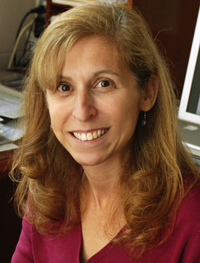非常抱歉,
你要访问的页面不存在,
非常抱歉,
你要访问的页面不存在,
非常抱歉,
你要访问的页面不存在,
验证码:

职称:Edwin S. Wilsey Professor of Mechanical & Aerospace Engineering
所属学校:Princeton University
所属院系:Department of Mechanical and Aerospace Engineering
所属专业:Mechanical Engineering
联系方式:609) 258-5129
Leonard's main area of research and teaching is in the field of control and dynamical systems, where she has made contributions both to theory and to application. The field involves designing and analyzing feedback and the behavior of complex, dynamical systems. In recent years she has focused on multi-agent systems in engineering (design of robotic teams) and in nature (analysis of animal and human groups) and mathematical approaches for leveraging insights across contexts. Her work examines the role of distributed feedback and interconnection in collective motion and collective decision-making and makes rigorous the connections between network and leadership structure and decision-making speed, accuracy, and robustness. She led a large, collaborative, multidisciplinary Adaptive Sampling and Prediction project on the development and demonstration, in Monterey Bay, CA in 2006, of an automated and adaptive ocean observing system consisting of a coordinated network of underwater robotic vehicles that move about on their own and carry sensors to collect scientific data about the ocean. She has collaborated with biologists to study the mechanisms that explain the collective dynamics of animal groups, including killifish, honeybees, caribou, and starlings, and to explain human decision-making under uncertainty. In 2010 she co-created Flock Logic, an art-making project that explored what happens when dancers carry out the mathematical rules for dynamic response used to model flocking birds.
Leonard's main area of research and teaching is in the field of control and dynamical systems, where she has made contributions both to theory and to application. The field involves designing and analyzing feedback and the behavior of complex, dynamical systems. In recent years she has focused on multi-agent systems in engineering (design of robotic teams) and in nature (analysis of animal and human groups) and mathematical approaches for leveraging insights across contexts. Her work examines the role of distributed feedback and interconnection in collective motion and collective decision-making and makes rigorous the connections between network and leadership structure and decision-making speed, accuracy, and robustness. She led a large, collaborative, multidisciplinary Adaptive Sampling and Prediction project on the development and demonstration, in Monterey Bay, CA in 2006, of an automated and adaptive ocean observing system consisting of a coordinated network of underwater robotic vehicles that move about on their own and carry sensors to collect scientific data about the ocean. She has collaborated with biologists to study the mechanisms that explain the collective dynamics of animal groups, including killifish, honeybees, caribou, and starlings, and to explain human decision-making under uncertainty. In 2010 she co-created Flock Logic, an art-making project that explored what happens when dancers carry out the mathematical rules for dynamic response used to model flocking birds.